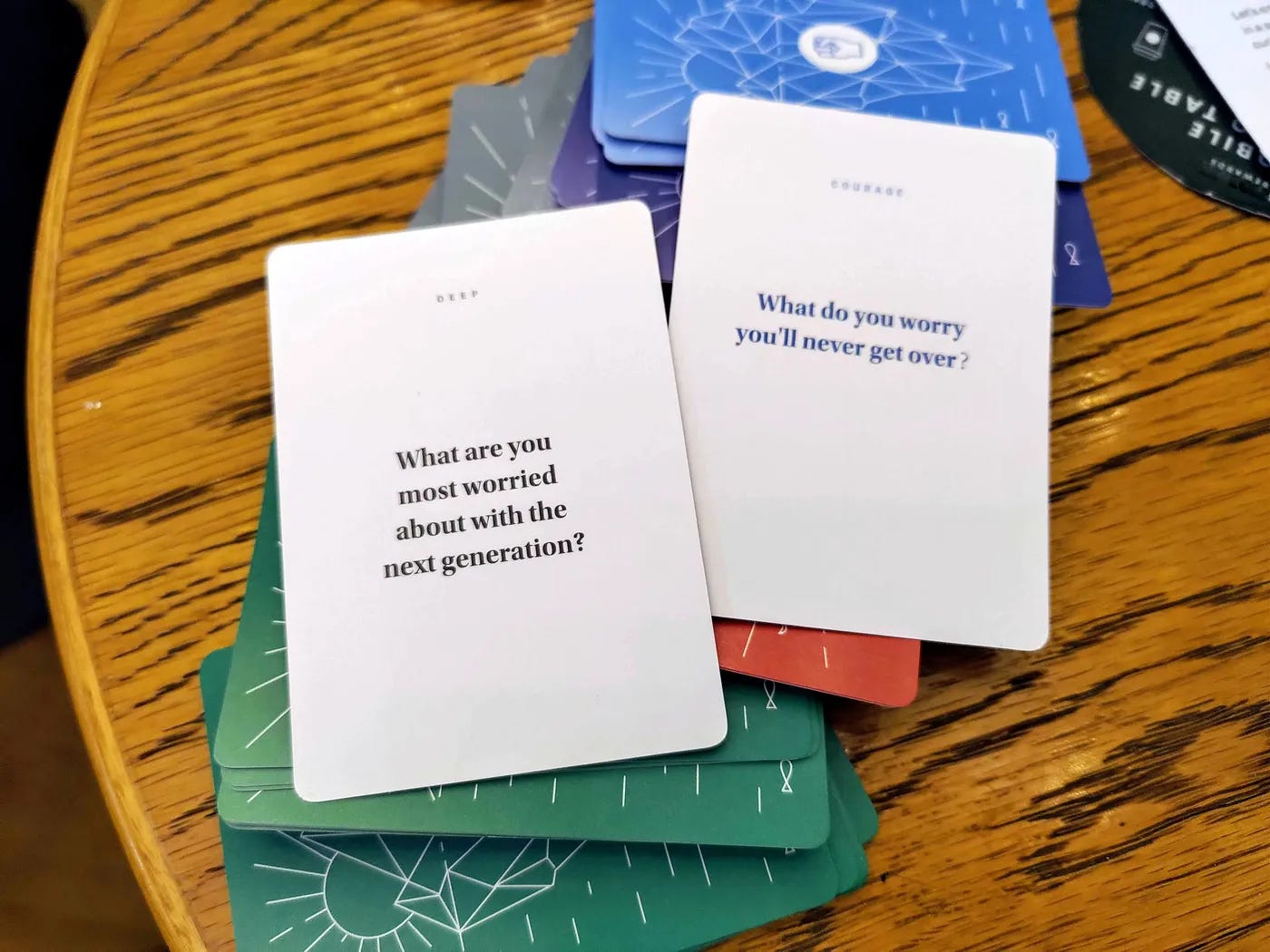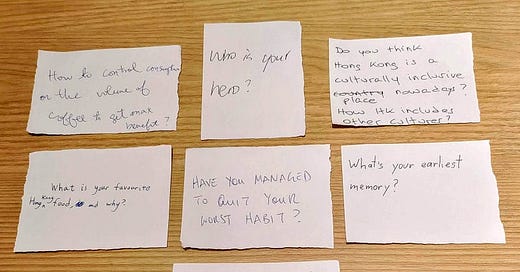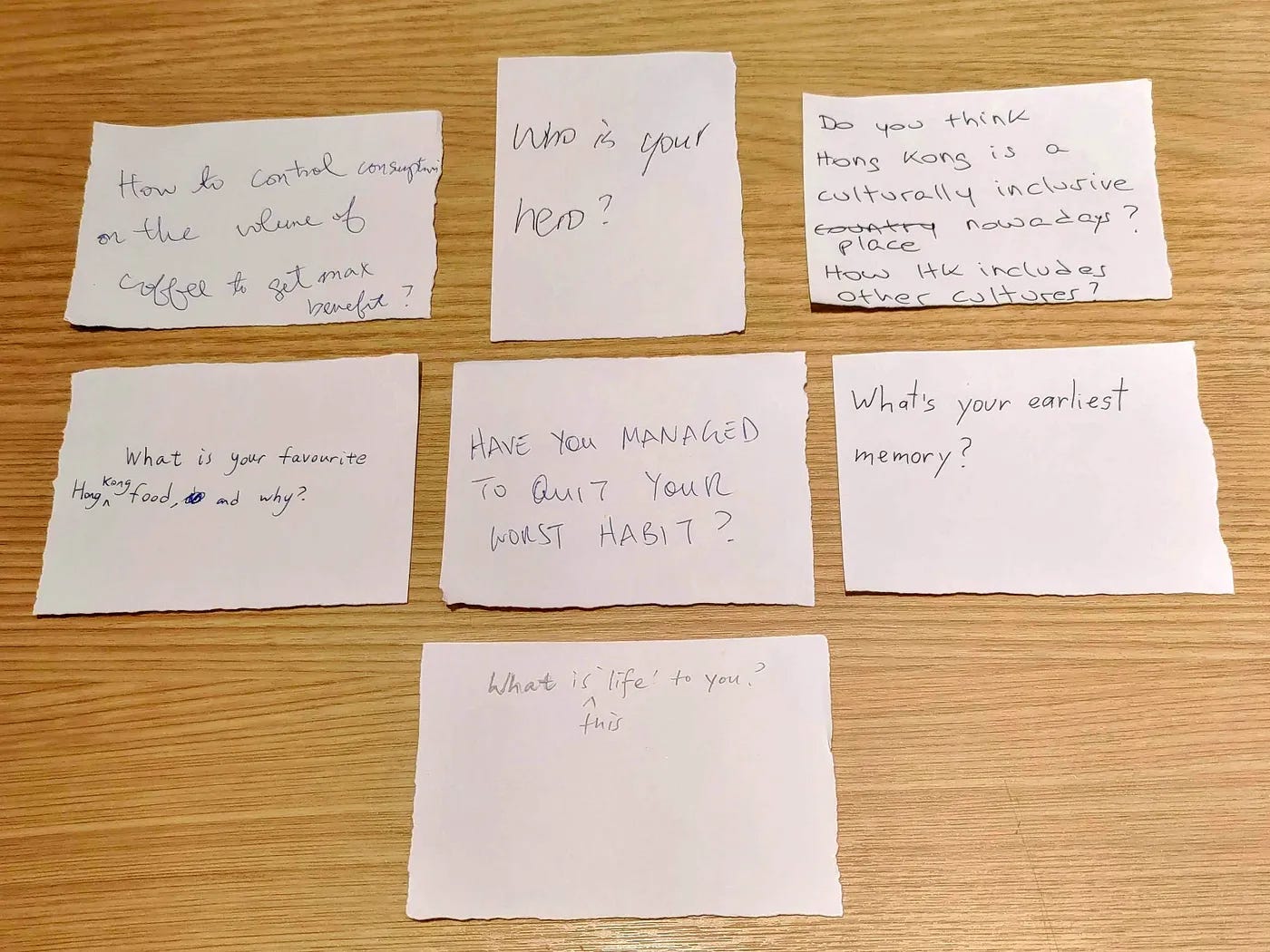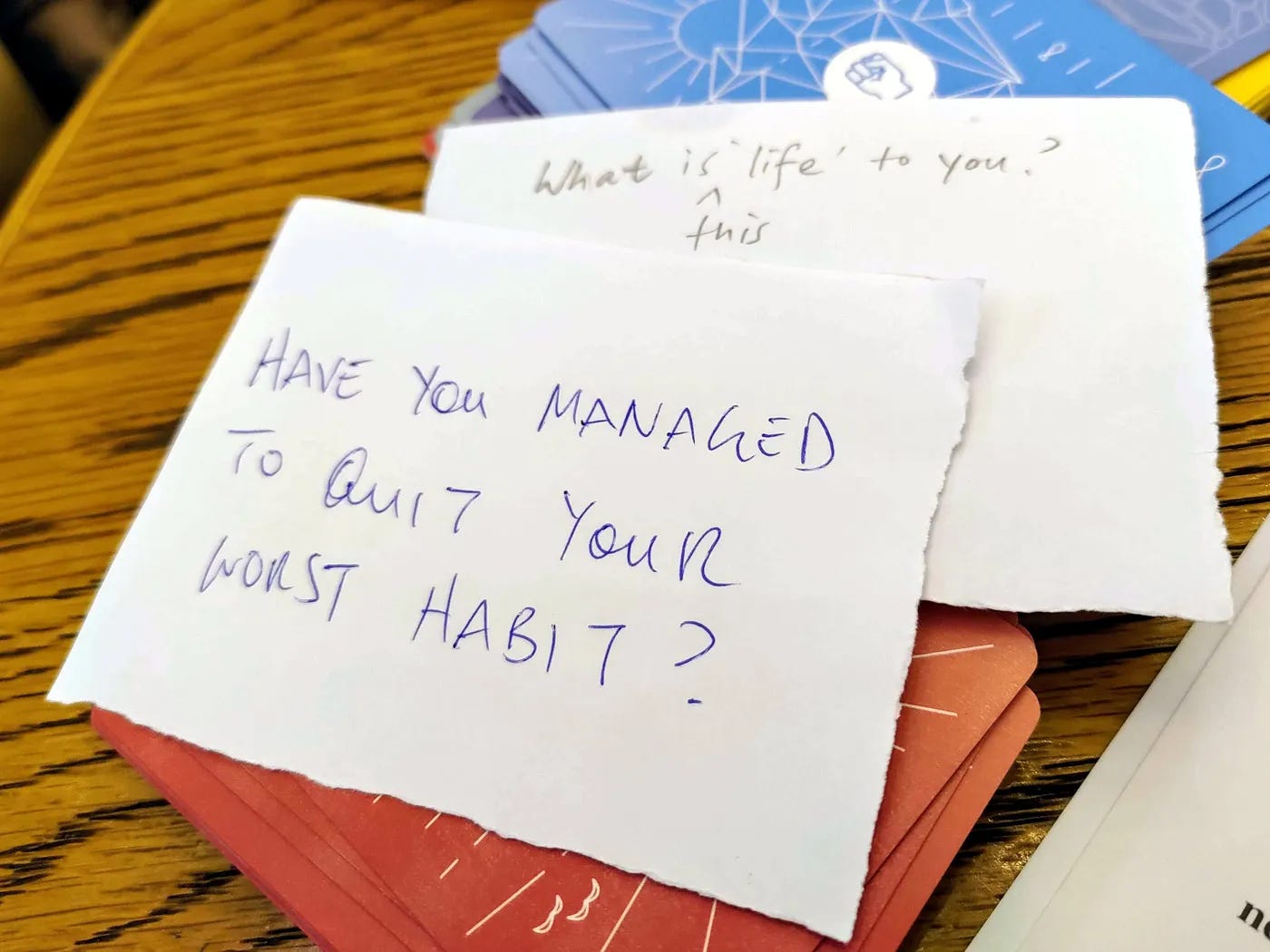Exploring Meaning and Habits: Reflections from Curious Souls Café Hong Kong
The Curious Souls Café was abuzz with anticipation as the group gathered for its sixth meeting in Hong Kong on 29th August, 2024. The session brought together both familiar faces and newcomers, each eager to engage in a thoughtful exploration of life’s complexities. From anxieties about the next generation to personal struggles with bad habits, the conversation offered a tapestry of perspectives woven together by shared curiosity and a willingness to engage in open dialogue.

Concerns for the Next Generation
To kickstart the discussion, we invited the two newcomers to pick two questions from our icebreaker card game, which is used during the first part of the session to spark conversations. The first one was thought-provoking:
“What are you most worried about with the next generation?”
The responses were insightful and multifaceted. Our newcomer from Spain expressed concerns about the lack of empathy and critical thinking skills she had observed among younger people. She attributed this to the prevalence of technology, which she believed had hindered the development of essential interpersonal and analytical abilities.
Others countered that view, pointing to examples of young people actively engaged in volunteering and community service. They acknowledged the challenges posed by social media but also highlighted the need to guide young people towards healthier online habits. They considered the role of education and the need to foster empathy, critical thinking, and a balanced approach to technology from an early age.
The conversation also touched on the natures of these concerns:
The global nature, with the group recognizing that these challenges faced by the next generation were not limited to any one geographic or cultural context.
The cyclical nature of societal trends, suggesting that with time and experience, the next generation might develop a more nuanced understanding of the world.
Overcoming Personal Struggles
The conversation then turned to a more personal focus, as the group went on to discuss the second question from our other newcomer:
“What do you worry you’ll never get over?”
This question prompted a range of introspective responses, with some participants admitting they hadn’t fully confronted this question before.
The newcomer, a recent university graduate in the UK, expressed his concern about the ever-increasing cost of living, a worry that resonated with many in the group. Others shared concerns about the loss of loved ones and the shrinking of family units over time.
The most poignant responses centered around themes of regret and trust. One participant spoke about the importance of living a life free of regret, carefully considering decisions to avoid future heartache. Another shared the difficulty of finding trustworthy individuals and the pain of broken loyalty. These anxieties about betrayal and disappointment underscored the significance of authentic human connection.
The Meaning of Life
The meeting progressed to the second part of the session, where each participant contributed a question and then voted on which one to discuss. The group chose the profound question:
“What is this ‘life’ to you?”
This central question elicited the most diverse range of answers, showcasing the group’s varied perspectives on life’s meaning and purpose. One participant described life as a spiritual journey full of ups and downs, a process of learning and growing from both positive and negative experiences. They emphasized the value of introspection and developing a deeper understanding of oneself and others.
Echoing this sentiment, another participant framed life as a continuous quest for truth, a journey of self-discovery through conversations, experiences, and reflections. They acknowledged that this “truth” is not static but evolves over time as we encounter new perspectives and challenges.
Others offered more pragmatic views, emphasizing personal fulfillment and meaningful relationships. One participant defined life as striving for happiness, setting goals, and finding joy in simple pleasures. They emphasized the importance of living in the present moment and appreciating the good things in life.
Drawing on philosophical concepts, our facilitator proposed that “life is a process of becoming.” Inspired by existentialist thought, he suggested that rather than seeking a fixed definition, we should embrace the ever-changing nature of life and strive for continuous self-improvement.
Overcoming Worst Habits
Building upon the earlier discussions, the group delved into the second-round question:
“Have you managed to quit your worst habit?”
This query elicited a range of personal narratives, as participants openly shared their challenges and strategies for overcoming problematic behaviors.
From a participant’s battle with late-night phone use to another’s struggle with time management, the group explored the deeply personal nature of habit formation and the difficulties inherent in breaking long-standing patterns.
Smoking emerged as a common struggle, with participants sharing their experiences with quitting. One described their journey as a “spiritual” one, involving prayer and a commitment to their family’s well-being. This personal story highlighted the power of connecting with a higher purpose to overcome deeply ingrained habits.
Others shared practical strategies for breaking bad habits, including replacing negative behaviors with positive ones and using techniques like timers or physical reminders. Procrastination also surfaced as common challenges, prompting suggestions for setting realistic goals, breaking down tasks into smaller steps, and holding oneself accountable by leveraging external accountability or symbolic gestures to aid the process.
The conversation also touched on the role of social pressures and cultural norms in shaping individual behaviors, particularly the stigma surrounding mental health support in certain communities. The group recognized the need for open dialogue and the creation of safe spaces to address these challenges, fostering a sense of collective understanding and the potential for meaningful change.
Conclusion
The Curious Souls Cafe’s sixth meeting was a testament to the transformative potential of thoughtful dialogue and the willingness to engage with life’s most profound questions. Through the exploration of concerns for the next generation, personal struggles, the meaning of life, and the overcoming of worst habits, the participants demonstrated a commitment to understanding themselves and one another more deeply.
By fostering a space for vulnerability, empathy, and the exchange of practical strategies, the Curious Souls Cafe empowered its members to continue their journeys of self-discovery and personal growth, ultimately contributing to the collective wisdom and understanding that can guide us all through the complexities of the human experience.





